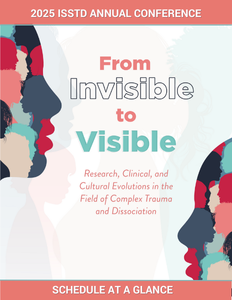Back
Posters
Poster Judging Hour
Associations Between Campus Sexual Violence (Re)Victimization and Dissociation
Friday, March 14, 2025
6:00 PM – 7:00 PM US Eastern Time
Learning Level: Beginning

Alexis A. Adams-Clark, PhD (she/her/hers)
Postdoctoral Fellow
The Warren Alpert Medical School of Brown University
Providence, Rhode Island, United States
Abstract
Approximately one in five women are sexually assaulted during college, with many reporting multiple victimizations. Research suggests that prior victimization history, as well as trauma-related dissociation caused by initial victimization, are factors that increase risk for future subsequent victimizations. Although sexual violence is always the perpetrator’s fault, trauma-related dissociative symptoms may disrupt survivors’ abilities to recognize cues related to safety/risk and to respond in self-protective ways. The following study uses data from self-report measures to examine the longitudinal associations between sexual assault (re)victimization and dissociative symptoms across three timepoints (baseline, three months, six months). The sample used for analyses included 147 college women (Mage = 19.44; 57.1% heterosexual; 76.2% white/European American) enrolled at a large, public university in the Pacific Northwest. Campus sexual assault survivors were oversampled, such that roughly half of participants (n = 76) reported a history of campus sexual violence at baseline. We hypothesized that a history of campus sexual assault victimization at baseline (as measured by the Sexual Experiences Survey), as well as dissociative symptoms at baseline (as measured by the dissociation subscale of the Trauma Symptoms Checklist), would be related to additional future sexual assault victimization across a period of 6 months, as reported during follow-up surveys.
Preliminary analyses indicated that participants with a history of campus sexual assault victimization at baseline had significantly higher dissociative symptoms at baseline and at 3-months (but not 6-months) than participants without a history of campus sexual assault victimization at baseline. In total, 28% of the sample (n = 43) reported additional victimization during the six-month period. Campus sexual assault history at baseline was a significant predictor of revictimization both three months and six months later. In a logistic regression model with revictimization as the outcome variable (0 = no victimization during 6-month study, 1 = victimization during six month study), both prior campus sexual assault victimization and dissociative symptoms were unique predictors of revictimization group. This suggests that, while dissociative symptoms may pose a specific risk for both survivors and non-survivors, victimization history may also be linked to revictimization through other unique processes in addition to dissociation.
These results have important clinical implications and are crucial for understanding the role that dissociative processes play in revictimization. Interventions may be able to prevent revictimization by working with survivors to address trauma-related dissociation.
Approximately one in five women are sexually assaulted during college, with many reporting multiple victimizations. Research suggests that prior victimization history, as well as trauma-related dissociation caused by initial victimization, are factors that increase risk for future subsequent victimizations. Although sexual violence is always the perpetrator’s fault, trauma-related dissociative symptoms may disrupt survivors’ abilities to recognize cues related to safety/risk and to respond in self-protective ways. The following study uses data from self-report measures to examine the longitudinal associations between sexual assault (re)victimization and dissociative symptoms across three timepoints (baseline, three months, six months). The sample used for analyses included 147 college women (Mage = 19.44; 57.1% heterosexual; 76.2% white/European American) enrolled at a large, public university in the Pacific Northwest. Campus sexual assault survivors were oversampled, such that roughly half of participants (n = 76) reported a history of campus sexual violence at baseline. We hypothesized that a history of campus sexual assault victimization at baseline (as measured by the Sexual Experiences Survey), as well as dissociative symptoms at baseline (as measured by the dissociation subscale of the Trauma Symptoms Checklist), would be related to additional future sexual assault victimization across a period of 6 months, as reported during follow-up surveys.
Preliminary analyses indicated that participants with a history of campus sexual assault victimization at baseline had significantly higher dissociative symptoms at baseline and at 3-months (but not 6-months) than participants without a history of campus sexual assault victimization at baseline. In total, 28% of the sample (n = 43) reported additional victimization during the six-month period. Campus sexual assault history at baseline was a significant predictor of revictimization both three months and six months later. In a logistic regression model with revictimization as the outcome variable (0 = no victimization during 6-month study, 1 = victimization during six month study), both prior campus sexual assault victimization and dissociative symptoms were unique predictors of revictimization group. This suggests that, while dissociative symptoms may pose a specific risk for both survivors and non-survivors, victimization history may also be linked to revictimization through other unique processes in addition to dissociation.
These results have important clinical implications and are crucial for understanding the role that dissociative processes play in revictimization. Interventions may be able to prevent revictimization by working with survivors to address trauma-related dissociation.
Learning Objectives:
At the conclusion of this session participants will be able to:
- Describe the association between campus sexual assault victimization and dissociative trauma-related symptoms
- Compare risk of sexual assault (re)victimization between college women who have a history of sexual victimization and no history of sexual victimization
- Explain the unique roles that both sexual violence victimization history and dissociative processes play in understanding (re)victimization among college women
- Discuss how longitudinal research on campus sexual assault (re)victimization using de-identified data is feasible
- Identify preliminary methods for reducing sexual violence (re)victimization through targeting dissociative processes

